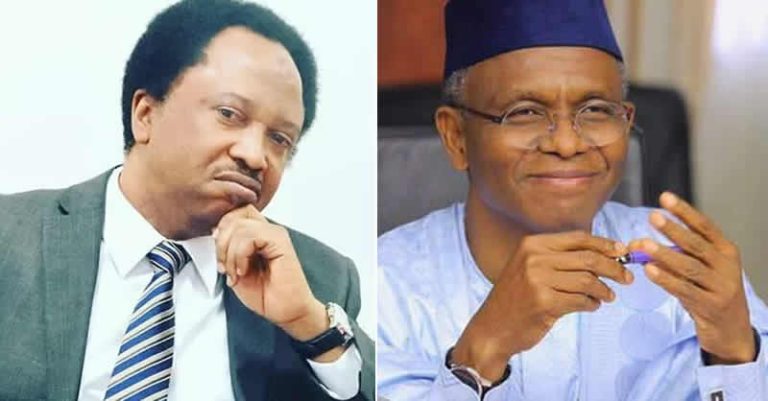The ministerial nomination of Nasir El Rufai, the immediate-past governor of Kaduna state, has greatly rattled Shehu Sani, the Senator who represented Kaduna Central between 2015 – 2019. Obviously still reeling from their previous political clash which resulted in his disgraceful exit from the Red Chamber and anti-climatic reduction to a social media commentator, Sani has embarked on a media campaign aimed squarely at tarnishing El Rufai’s imminent cabinet role.
He is presently on an interview spree as a self-appointed chief analyzer of the administration’s unfolding cabinet. In this role he carved for himself, he has talked himself hoarse about the purported negative implications of El Rufai’s latest elevation. A one-term Senator whose highlight includes the distribution of transistor radios to his constituents, Sani wishes for Nigerians to rise up in protest about the former governor’s nomination.
His reason is not that El Rufai is incompetent. He has made no such claim. His blind rage and bitterness have not prevented him from acknowledging what is a settled fact in Nigeria’s political realm. El Rufai belongs to a distinguished class of political actors in Nigeria who owe their success and enduring relevance to their talents and demonstrated leadership skills.
Sani’s attack has instead focused on the former governor’s personal virtues. He regards him as a ‘snake’ who dismantles and fractures relationships. With the passion of a latter-day evangelist, he has, across television stations, issued repeated warnings to the president and his vice about the ‘dangers’ of letting El Rufai get too close.
He is unperturbed by the fact that his previous warnings that El Rufai not be appointed at all went ignored. In fact, little proof exists that anyone pays serious attention to the spent activist who now burns time on Twitter as what members of the younger generation would describe as a ‘banger boy’. He issues wisecracks in a desperate attempt to hug the spotlight, even if as a clown. His irrelevance nevertheless, he takes seriously the vengeance quest to pull down El Rufai. Some have wondered why. But they discount the fury of a scorned Afro-hair man.
El Rufai’s role in his untimely political retirement is a sin he is unwilling to forgive. Even if it was a self-inflicted doom. Shehu Sani chose the path of envy and his politics was destructive. To get one over El Rufai, he abused his position as a federal lawmaker to shoot down a World Bank loan package meant to fund development in the state. El Rufai made this fact known to the public, specifically Shehu Sani’s constituents, and they decided it was time for him to return home. It wasn’t as if they had much to show for his representation except the occasional camel meat distributed during festivities and a cheap radio set.
Since then, Shehu Sani has known no rest. He made El Rufai the subject of his obsession and began to chronicle his life with the commitment and devotion of an enthralled disciple. Not many Nigerian politicians have dedicated biographers in the same fashion as politicians in the West. But in Shehu Sani, El Rufai may have found an unpaid volunteer. Sani recounts El Rufai’s political journey for a living. The only drawback is the wild interpretations he offers.
By Sani’s telling, all the major fall-outs recorded in the administrations and political organizations El Rufai served in were all due to his presence. It matters not that the conflicts he outlines as ‘proof’ of his bizarre claims each had its own unique history strongly tied to and driven by the personal ambitions and quirks of the main characters.
An instance is his insistence that Obasanjo’s estrangement from his vice, Atiku Abubakar, was somehow the doing of El Rufai. Sober minds, meanwhile, recognize that the conflict had its roots in Obasanjo’s quest to be president for life and Atiku’s own unbridled thirst for power. It was a fight fated to happen.
Sani’s busybody accounts not only offend common sense, but they also underline, albeit inadvertently, El Rufai’s lasting relevance in Nigeria’s leadership since 1999, when the fourth republic commenced. He certainly didn’t achieve this feat by obsessing over the political fortunes of another. His hard work, dedication, and uncommon brilliance culminated in his status as a widely-desired political commodity. If El Rufai is a snake, he is of a rare breed and manages to do the impossible time and again. He leaves a mark even on the hardest of rocks. His tenure as FCT Minister is one such example.
Perhaps that’s a lesson Shehu Sani can take from his journey if he can set aside his bitterness. El Rufai completed two terms as governor and wanted to leave the scene with a loud ovation. The president and a diverse crowd of Nigerians protested the decision and demanded that he pledges openly to continue in his service to the country. They dread the loss of his skills and talents to the halls of learning in Europe.
On the other hand, no tear has been shed over Shehu Sani’s descent from the National Assembly into obscurity. Whether in his home constituency of Kaduna Central or Nigeria at large, no one appears to care. He was ousted, banished, and quickly forgotten. Even when he took a Twitter break, his circus had no trouble moving on without him. Such is his material insignificance. This stark contrast underscores the world of difference in the public appreciation and quality of life of both men. One is a globally respected governance actor, the other not more than a pair of Twitter fingers and a television talking head.
Beyond sating his childish craving for vengeance, Shehu Sani’s media attack rounds will go the same way as his short-lived political career: impactless, unmemorable and useless.

